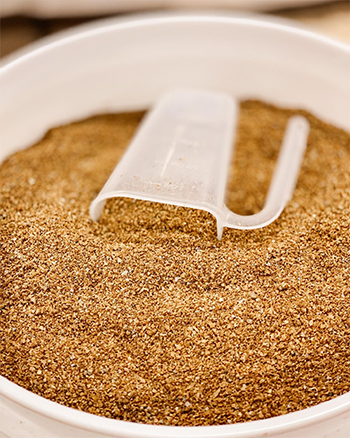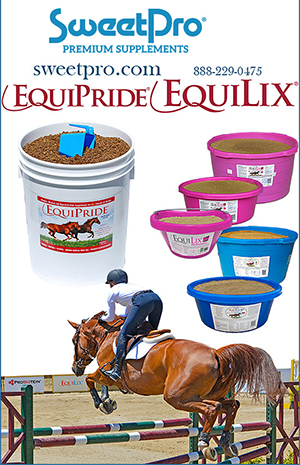 |
 |
|
Fermented Horse Feed Supplements, Supporting Gut Health.
Recent advances in understanding of the gut microbiome, the bacteria populations in the gut, have begun to
shift equine diets from traditional high-starch grains with molasses to more forage-based and fermented feed options. Article from SweetPro® Feeds
The gut microbiome regulates the immune system, maintains intestinal integrity and supports brain function through the “Gut-Brain Axis”.
Keeping the beneficial digestive bacteria populations of the microbiome in good condition requires nutrition the “good bugs” can utilize. A
postbiotic yeast culture and prebiotics should be considered as part of this bacteria supporting nutrition program. What is a Postbiotic?
The International Scientific Association of Probiotics and Prebiotics (ISAPP) defines “Postbiotic” as:
1 “a postbiotic is a preparation of inanimate microorganisms and/or their components that confers a health benefit on the host” (Salminen et al., 2021). ISAPP further defines Prebiotic as:
2 “a substrate that is selectively utilized by host microorganisms conferring a health benefit”. The advantages to equine body of feeding a
postbiotic yeast culture include the various nutritional components that make up a yeast cell.
3 Mannan Oligosaccharide, known as MOS, is a prebiotic fiber found in the cell wall of yeast. MOS has a number of health supporting
functions in the equine gastrointestinal tract (GIT). The most widely used application is to bind pathogens such as salmonella and e-coli.
When these pathogenic bacteria are bound, they can no longer form colonies or attach to the walls of the digestive tract. They are then
flushed out of the system. This binding ability of MOS is finding its place as a tool in the worldwide movement to limit the use of antibiotics in animal feeds.
4 Other important parts of yeast are components of the yeast cell wall (YCW), these include Chitin and ß-glucans. Chitin is a dietary fiber
that helps to stimulate good digestive bacteria such as the various subspecies of bifidobacteria and lactobacillus. ß-glucans have been
promoted commercially for heart health in humans, but they have many other benefits such as the ability to bind mycotoxins and pathogens while supporting the immune system
4a, antibody production and feed conversion in horses.
5 Yeast Fermentation Products (YFP) are also valuable postbiotic nutrition with several fermentation metabolites and vitamins made
available to the equine body.
6 There are several Prebiotic fibers that should be considered along with  Postbiotic yeast. These include Fructooligosaccharide (FOS),
Galactooligosaccharide (GOS), Xylooligosaccharide (XOS) and Arabinoxylooligosaccharide (AXOS). These prebiotic fibers nourish the good
digestive bacteria subspecies of bifidobacteria and lactobacillus. These two classifications are known as “keystone” species as they help break down feed
for other good bacteria to take advantage of. A broad range of complex prebiotic fibers support a complex GIT environment and helps limit gut
dysbiosis. When the microbiome is in a healthy and diverse condition, it supports feed conversion, nutrient absorption and the integrity of the digestive
tract wall by producing Short Chain Fatty Acids (butyrate). Postbiotic yeast. These include Fructooligosaccharide (FOS),
Galactooligosaccharide (GOS), Xylooligosaccharide (XOS) and Arabinoxylooligosaccharide (AXOS). These prebiotic fibers nourish the good
digestive bacteria subspecies of bifidobacteria and lactobacillus. These two classifications are known as “keystone” species as they help break down feed
for other good bacteria to take advantage of. A broad range of complex prebiotic fibers support a complex GIT environment and helps limit gut
dysbiosis. When the microbiome is in a healthy and diverse condition, it supports feed conversion, nutrient absorption and the integrity of the digestive
tract wall by producing Short Chain Fatty Acids (butyrate).
7 The Gut-Brain Axis is also involved. When the gut microbiome is in an
optimum condition, there is a proper regulation of the nervous system and cognitive behavior via the vagus nerve with the brain.
8 High starch diets in equine can have an impact on the Gut-Brain Axis with undesirable behaviors resulting from a microbiome that has significant dysbiosis.
9 Fermentation of the ration or supplement helps digestion by breaking down the feedstuff, removing much of the starch and making the nutrients more
available to the animal. Fermentation of feedstuffs was often done in earlier times, but due to the labor involved fell out of widespread use.
10 However; fermented feeds are being revisited today to help cope with the loss of antibiotics in feed. It complements the use of the postbiotics and
prebiotics mentioned earlier by improving and preserving feed quality to remove anti-nutritional elements. Distiller’s Dried Grains (DDGS) is
a current example of a fermented feed ingredient or carrier for supplementation. The starch component of grain, corn being the most
common DDG, has been reduced by yeast (starch being their energy source) and what remains is fiber, fat, protein and amino acids,
compatible with an equine digestive tract designed for small fiber meals consumed throughout the day.
11 Omega3 Fatty Acids bring another range of health support to the horse, the most noteworthy being a reduction of inflammation. Chronic inflammation is a problem in many animals.
12 Flaxseed with high Omega3 can also support horses with skin lesions (allergies) that result from insect bites and help keep their haircoats healthy.
There are a number of feed producers that provide one or more of the new generation  of ingredients for equine feeds. Of particular note,
EquiPride® and EquiLix® from SweetPro® Feeds are all-in-one and incorporate, a fermented grain carrier, yeast culture called ProBiotein®, flax meal and a complete
vitamin/mineral designed to minimize the need for multiple supplements. The yeast culture ProBiotein in these two products is both a postbiotic and a multi-prebiotic,
featuring a broad amino acid profile. It achieves this unique status by growing the yeast on a source media of multiple small grains, not molasses. of ingredients for equine feeds. Of particular note,
EquiPride® and EquiLix® from SweetPro® Feeds are all-in-one and incorporate, a fermented grain carrier, yeast culture called ProBiotein®, flax meal and a complete
vitamin/mineral designed to minimize the need for multiple supplements. The yeast culture ProBiotein in these two products is both a postbiotic and a multi-prebiotic,
featuring a broad amino acid profile. It achieves this unique status by growing the yeast on a source media of multiple small grains, not molasses.
Everything in these fermented, non-molasses equine supplements is geared toward supporting horse health and nutrient utilization, without high cost of using multiple
supplements to support the equine gut microbiome.
For more information about SweetPro® Feeds horse and cattle non-molasses,
fermented supplements with ProBiotein® visit www.sweetpro.com .
|
 |
 |
 |
 |
 |
|
To advertise your horse product or service, Contact Ann
|
|
|
|
InfoHorse.com, Horse Information Lives Here ®
5/3/2024
Contact Us to Advertise to over a million Horse Owners.
All images and content Copyright© 2023 by InfoHorse.com,
|
|
|
|
Articles, Academic Schools, Arena Maintenance, Animal Communicators, Barns, Barn and Accessories, Barn Equipment and Tractors, Breast Collars, Grooming Products for Horses, Hay Feeders, Horse Blankets, Horse Breeders, Horse Camping Gear, Career Schools, Horse Training Clinicians, Equestrian Clothing, Dogs and Puppies, Horse Fencing, Fly Control, Foal Care, Horse Footings, Horse Gifts, Horse Health and Nutrition, Hoof and Leg, Horse Insurance, Certified Trainers, Equine Lawyers, Leather Care, Links , Portable Horse Stalls, Arenas and Roundpens, Horse Riding Schools, Horse Schools, Safety Products, Services for Horses, Horse Trailers, Horse Shipping, Horse Skin Coat Care, Specialty Trainers, Horse Summer Camps, Tack, Horse Trainers, Treats and Snacks, Truck Accessories, Trucks, Horse Vacations, Western Lifestyle
|
|